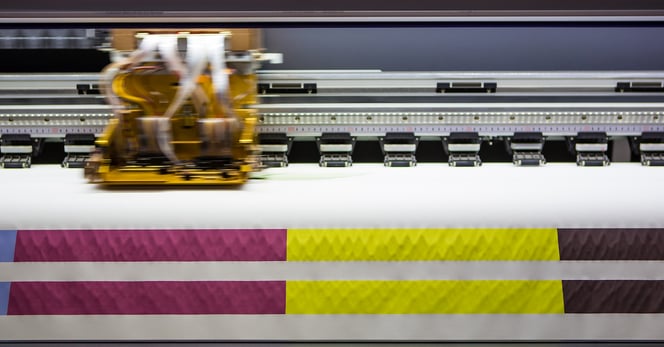
Navigating the Flow of the Global Water-Based Inks Market
The use of water-based inks is altering how commercial print shops approach their print operations.
Water-based ink is a significant development in the commercial printing industry. These environmentally friendly inks, compared to traditional solvent-based inks, are produced using water as a solvent. It came about as a response to the expanding demand for eco-friendly printing methods.
Due to their low amount of volatile organic compounds (VOCs), lower emissions, and safer working conditions for print shop staff, these types of inks have become an attractive option for mindful print shop owners.
A Dive into Water-based Inks
Water based inks are commonly used in various printing applications, such as textiles, paper, packaging, and labels. Their key components are pigments or dyes to provide color and a water-based compound to carry the colorants. This compound is a combination of water, humectants to regulate moisture content, binders to fix the color to the substrate, and thickeners or anti-foaming agents.
Here are the inks’ major features:
- Eco-friendliness
Although water based inks might have slightly higher upfront costs, they offer long-term cost-efficiency. Their general economic advantage is a result of lower energy consumption, waste production, and maintenance needs. - High-quality output
These printing inks are exceptional at reproducing fine details in color and clarity. They produce vivid, precise prints that can compete with those made with conventional solvent-based inks. This makes them a top option for applications that demand the highest print quality. - Durability
These inks are also known for their resistance to fading and wear. The prints maintain their brilliance and integrity over time. This longevity is a crucial advantage for applications that require durable graphics and text. - Health and Safety
Water-based inks contain fewer toxic chemicals compared to solvent-based inks. As a result, they are considered safer for both the environment and the people handling them. This promotes a healthier work environment and is particularly important for industries with strict safety regulations. - Economic Benefits
Although water based inks might have slightly higher upfront costs, they offer long-term cost-efficiency. Their general economic advantage is a result of lower energy consumption, waste production, and maintenance needs.
To further appreciate the significance of water based inks, let’s compare them to other ink types that are commonly used in the printing industry:
- Solvent-based Inks
Solvent-based printing inks can raise concerns regarding toxicity and environmental impact. They are known to release harmful VOCs and require costly pollution control measures. They are also reportedly less sustainable and demand more expenses to operate. - UV Inks
UV inks, despite being efficient, often come with higher equipment costs. They require specialized curing systems. Moreover, they are not suitable for all materials, which limits their versatility. - Latex Inks
Latex inks have certain limitations, including the need for warm-up time and high energy consumption. They also have a smaller range of compatible materials compared to water-based inks.
Water-based inks are recognized by some print experts as ‘the ink of the future’. They offer a balance between eco-friendliness, high-quality output, durability, safety, and long-term cost savings.
Benefits of Water-based Inks to Commercial Print Shops
Thanks to their unique features, water-based inks come with multiple benefits.
Besides having lower environmental impact and offering a greener option to print customers, water-based inks also contribute to operational efficiency. They eliminate the need for special equipment or costly ventilation systems. Print shops can easily transition from solvent-based inks to water based inks to save time and resources.
Another major advantage of water-based inks is versatility. They adhere well to various materials and surfaces. These include paper, cardboard, fabric, and even non-porous substrates like plastic and metal. This versatility opens up new market opportunities for print shops to cater to a wider range of customer needs.
Water based inks also make the cleanup process simpler. Unlike solvent-based inks that require hazardous waste disposal and meticulous equipment maintenance, water-soluble inks make post-printing cleanup easier and safer.
With all of those in mind, an increasing number of commercial print shops regard water-based inks as a sustainable, efficient, and versatile choice. After all, this type of ink does not just attract eco-conscious customers—it also streamlines operations, helps expand shop services, and simplifies the printing process.
Thinking of Adding Printers With Water-based Inks To Your Shop?
The undeniable shift towards sustainable and high-quality printing solutions underscores the growing importance of water-based inks in the commercial print shop industry.
By lowering harmful emissions and fostering a greener print industry, these environmentally friendly inks provide a compelling substitute for conventional solvent-based inks. They are undoubtedly a valuable option for today's environmentally conscious clientele.
SumnerOne's comprehensive print solutions include the Kyocera TASKalfa Pro 15000c, a popular printer that uses water based ink. This innovative printer produces outstanding print quality while minimizing its detrimental environmental impact.
Get in touch with SumnerOne today for high-quality, eco-friendly, and vendor-agnostic print solutions, such as water based ink printers!
 FREE EBOOK DOWNLOAD
FREE EBOOK DOWNLOAD



